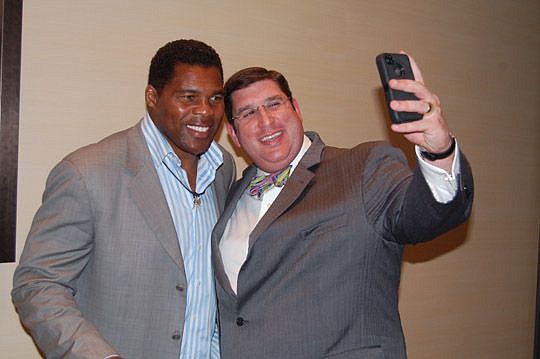
With a keynote address by former University of Georgia and NFL running back Herschel Walker, Jacksonville Community Council Inc. unveiled Tuesday “Unlocking the Pieces,” its inquiry into the state of mental health care.
Walker was chosen to headline the event because he suffers from dissociative identity disorder.
He said at a news conference he didn’t realize he had undergone a negative personality change until he retired from football.
At UGA, he set the NCAA freshman rushing record and earned consensus All-American honors in three consecutive seasons. Walker set 10 NCAA records, 15 Southeastern Conference records and 30 Georgia all-time records. In his junior year, he earned the 1982 Heisman Trophy.
That led to a professional career, with the 1983 New Jersey Generals of the United States Football League. Walker joined the NFL and the Dallas Cowboys in 1986, when he led the league in rushing and was selected All-Pro.
He then played with the Minnesota Vikings and the Philadelphia Eagles. Walker returned to the Cowboys in 1996 and retired in 1997.
Walker said he kept a journal for years. When he took time to review what he had written, he said he was shocked.
“A lot of my writing was about killing and death,” Walker said.
A devout Christian all his life, he first turned to his pastor for help, but discovered faith alone was not the answer.
“My pastor said that prayer is good, but sometimes, you’ve got to get up and do something,” Walker said.
After seeking medical treatment, he was diagnosed with DID, similar to multiple personality disorder.
Through therapy, Walker learned he had endured much pain as a child when he was bullied and had to live with a speech impediment.
That pain was repressed and didn’t manifest itself until years later.
“I didn’t deal with the pain I suffered,” he said. “I tell people today, if you have pain, deal with it then.”
Walker’s journals attracted the attention of Simon & Schuster, which used much of the material to publish “Breaking Free,” a memoir in which Walker shares the story of his life and how he copes with his illness.
After his friends and people who knew him from his football career read the book, they treated him differently. That’s when Walker realized that having a mental health issue comes with a stigma.
“Thay ran away from me like I was a vampire,” Walker said. “Now, they’re coming back. When I walk through an airport, people want to talk to me. Not about football, but because they have a problem.”
Walker said he was in Jacksonville for the release of the JCCI report in hopes of giving people hope.
“There is help out there. Do not look down on yourself,” he said. “I’m here to tell you it’s not going to be easy, but you’ve got to know that you can overcome. What has happened to me has made me better.”
The JCCI report was prepared after a committee of more than 80 members chaired by United Way of Northeast Florida President and CEO Michelle Braun. They worked for six months with representatives from local mental health care and social service providers to not only analyze the state of mental health care in Northeast Florida, but to develop a plan of action to improve access and services for people who need them.
The study determined “mental illness is pervasive in Northeast Florida” and it affects people of all ages, genders, races, sexual orientations and socio-economic standings.
While anyone can be vulnerable to mental health issues, some groups are more likely to be affected. Those include people living in poverty, military veterans, victims of crime, people who are homeless and people in non-dominant social groups such as women, people of color and members of the lesbian, gay, bisexual and transgender community.
The committee recommends improving advocacy and community engagement in order to better provide services for people with mental health illness; better coordinating care among agencies and the medical community; and increasing the number of mental health professionals practicing in the area; and improving the public’s awareness of mental health needs and services available.
Ben Warner, JCCI president and CEO, said releasing the report is the first step in the community taking action to improve local mental health care.
“Now comes the implementation phase,” he said.
@DRMaxDowntown
(904) 356-2466